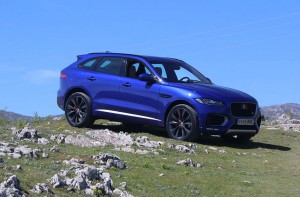Virtually every automaker now offers the ability to pair a smartphone with their vehicles’ infotainment systems. More and more are adding phone-based technologies like Apple CarPlay and Android Auto, as well as WiFi hotspots that can be used by numerous mobile devices simultaneously. Ford and VW, meanwhile, are now integrating Amazon’s cloud-based voice assistant, Alexa, into their vehicles.
The downside is that all these features can blow through a motorist’s data plan at a frenetic pace, quickly adding unexpected charges to the monthly bill. The four major service providers have been addressing the data drain for smartphone users by introducing new, unlimited data plans. Now, they’re looking to do the same thing for those who subscribe to vehicle data plans.
Jaguar Land Rover today announced it will offer unlimited data on vehicles using its InControl WiFi system for $20 a month. The prepaid plan retains AT&T as the provider for data services to its vehicles. InControl is offered as a standard feature on some JLR models, and as an option on others.
“Wireless connectivity and connected car services continue to be a key driver for new vehicle purchases, so we’re happy that this attractive price will provide Jaguar Land Rover customers with an enhanced ownership experience through the use of all the Wi-Fi enabled benefits,” said David Larsen, Jaguar Land Rover North America Product Planning Manager.
The British maker’s move comes three weeks after General Motors said it would begin offering an unlimited plan on a variety of its own Chevrolet models. Virtually every new Chevy now is offered with a 4G LTE WiFi package and there are currently about 4.1 million of those vehicles on the road, with the figure growing rapidly.
“We have contractors bidding jobs in their Silverados, families streaming movies in their Suburbans and Malibus, and everyone tapping into the cloud for music,” said Alan Batey, president of GM North America and global head of Chevrolet, adding that by switching to unlimited data, “our momentum can only grow.”
Currently, GM’s OnStar service was charging Chevy owners $10 a month for 1 gigabyte of data, and $40 for 10 gB. Motorists could also opt for one-day passes, at $5 for 250 megabytes. But owners were finding they could quickly blow through those limits if they routinely streamed music, rather than listening to the radio – and even more so if they had kids hooking up to the built-in WiFi watching streaming video.
(Why do Tesla buyers bond with the brand, despite constant quality issues? Click Here to find out.)
The launch of unlimited data plans for in-car WiFi hotspots is expected to encourage even more owners to turn on those systems. While smartphone users might question the need for another data plan, experts point out that built-in systems typically deliver much better reception than a handheld smartphone, in part because of the exterior antennas they use. That translates into quicker data speeds and fewer dropouts.

Gerri Martin-Flickinger, Starbucks executive vice president and chief technology officer, announced the partnership with Ford and Amazon at her company's annual meeting.
In-car WiFi doesn’t make sense for everyone, says Stephanie Brinley, senior analyst with IHS Automotive, especially those who have short commutes and no kids to ferry around.
On the other hand, “If you spend a lot of time in the car you can chew up a lot of data,” so, Brinley adds, “an unlimited data plan can make a lot of sense.”
Going forward, automakers are laying out plans that would suggest everyone will be chewing up a lot more data. The rollout of features such as Apple CarPlay and Android Auto has been rapid, and a number of vehicles are adding cloud-based virtual assistants.
During its annual meeting this week, Starbucks confirmed it will now allow motorists in Ford vehicles equipped with the Sync3 infotainment system to tap a button on the steering wheel, call up Amazon’s Alexa and order a cup of their favorite coffee to go.
(Java to go? No problem, as automakers add virtual assistants, other mobile services. Click Here for the story.)
In-vehicle services – whether shopping or watching streaming video — are expected to become even more popular as autonomous and fully driverless vehicles take to the road.
In fact, one of the biggest concerns is how to provide all the data that motorists may soon be accessing. Next-generation 5G wireless transmission systems will yield a big bump in performance. But automakers and data providers are looking at even more advanced systems.
During a news conference at the 2016 Detroit Auto Show, Toyota showed off a mobile system developed by Kymeta Corp. capable of streaming not just megabytes or even gigabytes, but terrabytes of data seamlessly.
“Our goal is to change the way your vehicle communicates globally, securely and cost-effectively,” said Nathan Kundtz, president and CEO of Washington State-based Kymeta, which tapped into military-derived technology to develop the mobile antenna system.
(For more on the Toyota/Kymeta project, Click Here.)


